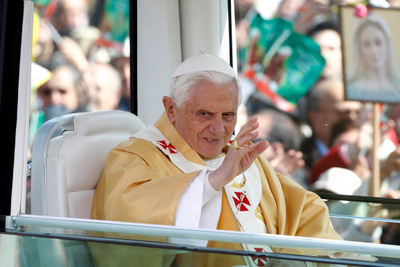

Pope in Fatima: defending life and marriage is essential to building the civilization of love
Matthew Harrison
Thursday, May 13, 2010
Pope Benedict XVI has told 9000 representatives of pastoral and social organizations in Portugal that defending life and marriage is essential to building the civilization of love.
 The groups gathered at the Church of the Most Holy Trinity in Fatima today.
The Holy Father expressed his "deep appreciation" for the initiatives that combat the:
The groups gathered at the Church of the Most Holy Trinity in Fatima today.
The Holy Father expressed his "deep appreciation" for the initiatives that combat the:
 The groups gathered at the Church of the Most Holy Trinity in Fatima today.
The Holy Father expressed his "deep appreciation" for the initiatives that combat the:
The groups gathered at the Church of the Most Holy Trinity in Fatima today.
The Holy Father expressed his "deep appreciation" for the initiatives that combat the:
... socio-economic and cultural mechanisms which lead to abortion, and are openly concerned to defend life and to promote the reconciliation and healing of those harmed by the tragedy of abortion.He then cited essential elements in building the civilization of love:
Initiatives aimed at protecting the essential and primary values of life, beginning at conception, and of the family based on the indissoluble marriage between a man and a woman, help to respond to some of today’s most insidious and dangerous threats to the common good.The Pontiff acknowledge that today we are experiencing a "socio-economic, cultural, and spiritual crisis" but added that this provides the opportunity for the Church to offer her social message, and in our social doctrine, to help relieve the burden of this crisis. He also said it is a "fundamental step" that Christian charitable activity is granted "autonomy and independence from politics and ideologies even while cooperating with state agencies in the pursuit of the common good." He touched on a concern of the Church in Portugal, and certainly throughout the world: attracting and training a "new generation of servant leaders." The Pope also stressed the importance of a proper synthesis between one's "spiritual life and apostolic activity." Appropriately, Pope Benedict tied in the message of Our Blessed Mother at Fatima: "penance, prayer and forgiveness aimed at the conversion of hearts." Concluding, "In this way you are building the civilization of love, whose seeds God has sown in the heart of every man and woman, to which faith in Christ the Saviour gives abundant growth." See the Holy Father's full address below:
CELEBRATION OF THE WORD WITH SOCIAL PASTORAL CARE ORGANIZATIONS HOMILY OF THE HOLY FATHER BENEDICT XVI Church of the Most Holy Trinity - Fátima Dear Brothers and Sisters, Dear Friends, You have heard Jesus say: “Go and do likewise” (Lk 10:37). He exhorts us to imitate the example of the Good Samaritan, which was just now proclaimed, when approaching situations which call for fraternal assistance. And what is this example? It is that of “a heart which sees”. “This heart sees where love is needed and acts accordingly” (Deus Caritas Est, 31). This is how the Good Samaritan acted. Jesus does not only exhort us; as the Fathers of the Church taught, he is himself the Good Shepherd who draws near to each man and “pours upon his wounds the oil of consolation and the wine of hope” (Portuguese Common Preface VIII). Christ then leads him to the inn, which is the Church, entrusts him to the care of his ministers and pays in person, beforehand, for his healing. “Go and do likewise”. The unconditional love of Jesus which has healed us must now become a love bestowed freely and generously, through justice and charity, if we want to live with a good Samaritan’s heart. I am very happy to meet you in this holy place where God chose to remind mankind, through Mary, of his plan of merciful love. I offer a friendly greeting to all of you, and to the institutions which you represent. ... Continue reading- CNS photo/Stefano Rellandini, Reuters
Related Articles:
<<













